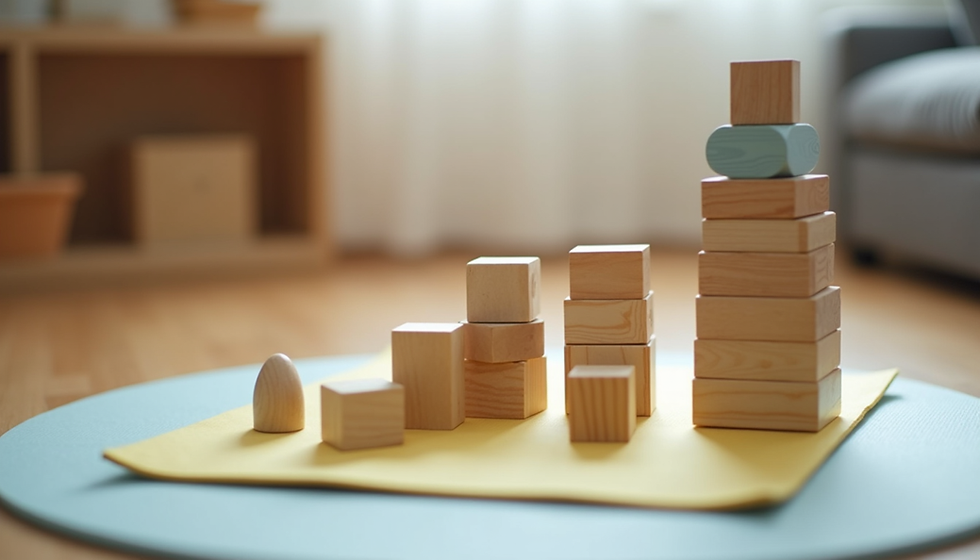How Montessori Toys Encourage Learning Through Play
- G MANASA
- Jun 16, 2025
- 3 min read
The Montessori method emphasizes learning through exploration and play. One of the key elements of this approach is the use of Montessori toys, which are specifically designed to foster independence, critical thinking, and creativity in children. In this blog post, we will explore how these engaging toys encourage learning and development in a variety of ways.
Montessori Toys: An Overview
Montessori toys are intentionally crafted to align with the developmental stages of children. Unlike traditional toys that often promote passive play, these toys encourage active participation. They aim to engage various senses and are typically made from natural materials, which appeal to children’s innate curiosity.
Research shows that children learn best when they can explore their environment freely. Montessori toys are perfect for this as they promote hands-on learning. They support various skills, including sensory perception, fine motor development, and problem-solving.

The Role of Imagination and Creativity
One of the standout features of Montessori toys is that they encourage imaginative play. When children have open-ended toys, like blocks and art supplies, they can express their creativity by building, stacking, or inventing their own games.
For instance, building blocks can turn into anything from a castle to a rocket ship in a child's mind. This type of play fosters creativity and allows children to draw connections between concepts, which is essential for cognitive development.
The lack of structured play discourages passivity, allowing children to become the architects of their own playtime. This kind of exploration can enhance their imaginative skills, leading to improved problem-solving abilities.

Skill Development Through Hands-On Learning
Montessori toys are designed to actively engage children and help develop various skills. Many toys are aimed at strengthening fine motor skills, which are crucial for tasks such as writing and self-care.
For example, sorting toys can teach children about colors, shapes, and sizes, helping enhance their cognitive abilities. Learning to grasp various objects encourages dexterity and coordination.
Additionally, practical life toys that mimic household activities—like child-sized cleaning tools—teach responsibility and the value of contributing to the home. This experiential learning allows children to acquire real-world skills that will benefit them as they grow.

Encouraging Independence and Confidence
One of the most important aspects of the Montessori method is fostering independence. Montessori toys are designed to be self-correcting, allowing children to learn from their mistakes without adult intervention. This builds self-confidence as children can accomplish tasks on their own.
Having the freedom to explore and make choices encourages children to take initiative. They learn to trust their instincts and develop decision-making skills, which are crucial for personal and academic success in the future.
Montessori toys allow children to feel empowered through their independent play, laying the groundwork for future learning.
Social and Emotional Growth
Montessori toys also play a significant role in promoting social and emotional development. When children engage in cooperative play, they learn important social skills such as sharing, teamwork, and conflict resolution.
Using toys designed for group activities—like building sets or large puzzles—can help children understand the dynamics of teamwork. They learn to communicate ideas and share resources, which is essential in building strong interpersonal relationships.
Furthermore, the challenge of a toy that requires collaboration helps to foster patience and empathy. When children support each other in completing tasks, they develop a sense of community, which positively impacts their emotional health.
Final Thoughts on Montessori Toys
Montessori toys are more than just playthings; they are educational tools that facilitate learning through engagement. By promoting imagination, creativity, independence, and social skills, these toys encompass the holistic learning approach advocated by the Montessori philosophy.
For parents seeking to provide their children with enriching experiences, choosing the right toys can make a significant difference. Products like a Montessori educational toy can enhance learning while keeping play enjoyable.
Investing in these types of engaging playthings can yield long-term benefits for children, nurturing their growth as independent thinkers and learners. By choosing Montessori toys, families can foster an environment that not only values education but also cherishes the joy of play.
Embrace the Montessori method in your home, and watch your child thrive through the magic of learning and play.



Comments